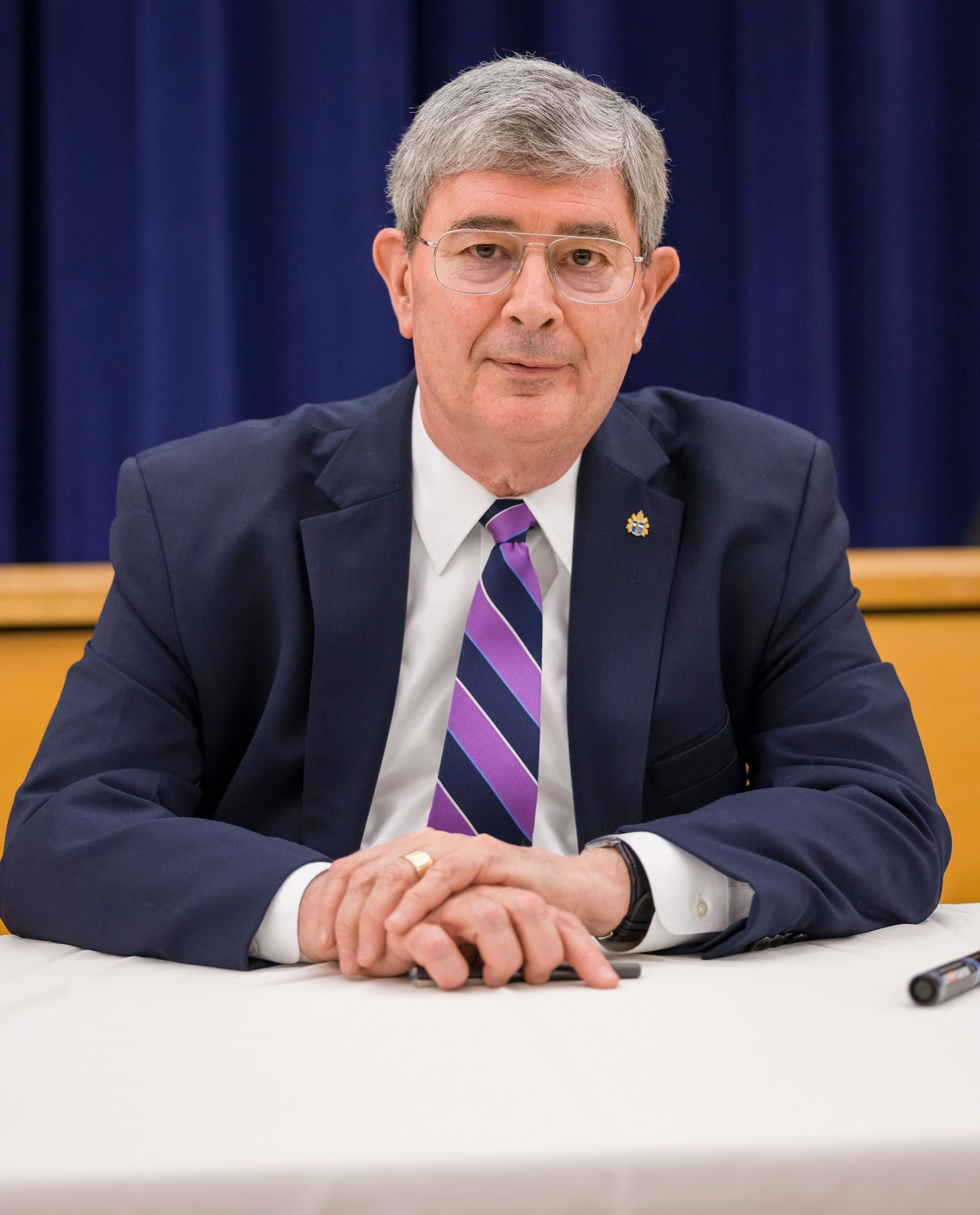Bear the standard for religious orthodoxy with First Things. Make your contribution to our 2023 spring campaign today at firstthings.com/donate.
On first encountering Fr. Victor B. Galeone at Baltimore’s St. Paul Latin High School in September 1965, my freshman classmates and I didn’t imagine we were meeting the future bishop of St. Augustine, Florida. What everyone quickly recognized, however, was that he was a language teacher unlike any we had met before. For Fr. Galeone—rail-thin with crinkly black hair, dressed in an immaculate cassock and full of energy and cheer as he bounced around the Latin I classroom—believed that we should learn Latin the way we had first learned English: by speaking it. So from the git-go, we followed this pied piper of Latinity in a series of verbal exercises, built around four paradigmatic sentences, that got us accustomed to a highly inflected language in which word endings meant everything and word order meant virtually nothing.
When we had the basic noun declensions and verb conjugations under a degree of control, Fr. Galeone fed us a series of ditties to facilitate our memorizing other basics of Latin grammar. These days, I sometimes can’t remember what I thought to do a minute ago (my brother the physician tells me that the clinical name for this is “Benign Senescent Forgetfulness,” which is only mildly reassuring). But to this minute, and without the slightest hesitation, I can rattle off his “Put the ablative with de/cum and sine, ab and e(x)/ coram, tenus, pro, and prae/sub and in go either way.” That our teacher would lead us in these chants with an enthusiasm bordering on glee, his voice rising at the end of a rather silly mnemonic that nonetheless got the grammatical point into our adolescent skulls, made learning elementary Latin more a pleasure than a chore.
Looking back on those innocent days from the retrospective of more than half a century, one other characteristic of Fr. Galeone remains firmly in my memory: the extraordinary reverence with which he celebrated Mass—a first indicator, perhaps, that we were dealing not only with a gifted linguist and language teacher but with a saintly man on fire with love of the Lord Jesus.
Fr. Galeone wanted to share that love with others, so when our high school closed in 1969, he did two five-year stints in the Peruvian missions. He was already fluent in Spanish, but he mastered at least one native language and evangelized the poorest of the poor in circumstances full of danger, as Peru in those days was being torn apart by the Maoist maniacs of the Sendero Luminoso (Shining Path). That decade of missionary service was of a pattern with his pastoral approach to every situation in which he found himself: Find the poorest, or neediest, or most hurting people and serve them first. Thus, when he was named bishop of St. Augustine in 2001, Victor Galeone spent hours ministering to death row inmates, a practice he continued in South Carolina when, after his retirement as a diocesan bishop, he lived with the Trappist monks of Mepkin Abbey.
(His episcopate embodied his determination that the Novus Ordo be celebrated with dignity, including musical dignity. Thus a few years after he went to Florida, he called me one morning and said, “Hi, George, it’s Vic. You would have been very proud of me this morning.” To which I replied, “Victor, I’m always proud of you, but why should I be even more proud of you today?” “Because this morning I called the diocesan liturgy director and told her, ‘If the bishop ever hears “Gather Us In” at the beginning of a Confirmation Mass again, there will be no Confirmation!’”)
His last few years were difficult, as Alzheimer’s systematically emptied Bishop Galeone’s exceptional mind before his death on May 29 at age 88. He remained serene, however, and his love for the Lord Jesus shone until the end. At a Mass in Baltimore before the more formal funeral Mass and interment in St. Augustine, one of the Little Sisters of the Poor who had cared for him told me that, when the priest celebrating Mass in the Little Sisters’ chapel brought Bishop Victor Holy Communion in his wheelchair, he would kiss the consecrated host before consuming it.
Brilliance and humility met in Victor Galeone and were fused by hours of daily prayer that left calluses on his knees. It was a privilege to call him teacher and friend. It is reassuring to have him now as an intercessor at the Throne of Grace, where there is no cognitive disarray and (as St. Paul taught in 1 Corinthians 13:12) he knows even as he is known.
George Weigel’s column “The Catholic Difference” is syndicated by the Denver Catholic, the official publication of the Archdiocese of Denver.

George Weigel is Distinguished Senior Fellow of Washington, D.C.’s Ethics and Public Policy Center, where he holds the William E. Simon Chair in Catholic Studies.
Did you know that for every dollar in program revenue, readers like you give $2.50? Your support is urgently needed to champion the truth of orthodoxy amidst a proliferation of false religions.
Take your stand by supporting the 2023 First Things spring campaign with a gift today at firstthings.com/donate.
You have a decision to make: double or nothing.
For this week only, a generous supporter has offered to fully match all new and increased donations to First Things up to $60,000.
In other words, your gift of $50 unlocks $100 for First Things, your gift of $100 unlocks $200, and so on, up to a total of $120,000. But if you don’t give, nothing.
So what will it be, dear reader: double, or nothing?
Make your year-end gift go twice as far for First Things by giving now.


